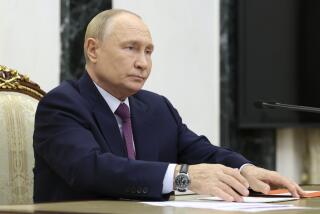U.S. on Risky Road if It Uses Nuclear Bluff
- Share via
The Bush administration seems to be moving toward preemptive nuclear strikes against those who threaten the U.S. with weapons of mass destruction. This threat to use nuclear weapons has a big flaw: We might have to make good on it.
Weapons of mass destruction are indeed the central threat to U.S. national security and our way of life. The Bush administration’s nuclear posture review already has eroded the “nuclear taboo”; the new strategic doctrine now being developed may make the use of nuclear weapons even more likely.
Warfare has matured to the point that a nuclear weapon that can fit in a cargo container, a truck or even a suitcase could destroy a city. If we can prevent a catastrophe involving chemical, biological, nuclear or radiological weapons by striking first, then we must.
But we should do so within the bounds of international law. These rules are to our advantage and in the interest of civilization as a whole. If our example encourages most of the world to stop playing by the rules most of the time, we will be in even greater danger.
International law allows for preemptory self-defense, but it demands that such first strikes must meet two strict requirements: necessity and proportionality.
First, it must be demonstrated that force is necessary to prevent an imminent attack. It is not enough that an enemy possesses weapons of mass destruction. There must be a credible indication that their use is imminent.
Second, the preemptive action must be proportionate to the threat. Only a truly mammoth threat would be proportionate to the use of a nuclear weapon. Since no threat of the magnitude of a nuclear weapon’s devastation has been made public, the administration’s proposed strategic doctrine suggests a lowering of this legal standard. It seems to assert that the U.S. has an exclusive privilege to step outside the law.
If the most powerful nation in the world asserts such a first-use doctrine, other countries--some facing overwhelming threats--are likely to begin to make similar claims. The reason that only a tiny minority of countries has joined the “nuclear club” is that the vulnerability of all, bolstered by international law in the form of the Nuclear Nonproliferation Treaty, has convinced most countries that these weapons are unusable, despite the example of World War II.
But if the U.S. uses another nuclear weapon, we should expect one to be used against us.
This might happen anyway. The West was slow out of the gate in rendering assistance to the former Soviet Union to secure its arsenal, and it still does not give this critical task the attention it demands. There are dark corners of Iraq and elsewhere where international inspectors are unwelcome.
More countries with nuclear weapons will mean more places for terrorists to steal or buy nuclear weapons or material. Less confidence in our conventional superiority will weaken our friendships and embolden our enemies to put their focus where we have--on nuclear weapons.
Terrorists have demonstrated to us that they have the will to act with absolute brutality. There are plenty of reasons to believe we may lose a city to terrorism. We should not add one more reason through a misguided doctrine.
Terrorists may not have cities to burn, but we do. Civilization is the source of our strength and their one true enemy. Redefining ourselves to be more like them will not make us more secure. It will leave our cities naked before the world.
More to Read
Sign up for Essential California
The most important California stories and recommendations in your inbox every morning.
You may occasionally receive promotional content from the Los Angeles Times.










